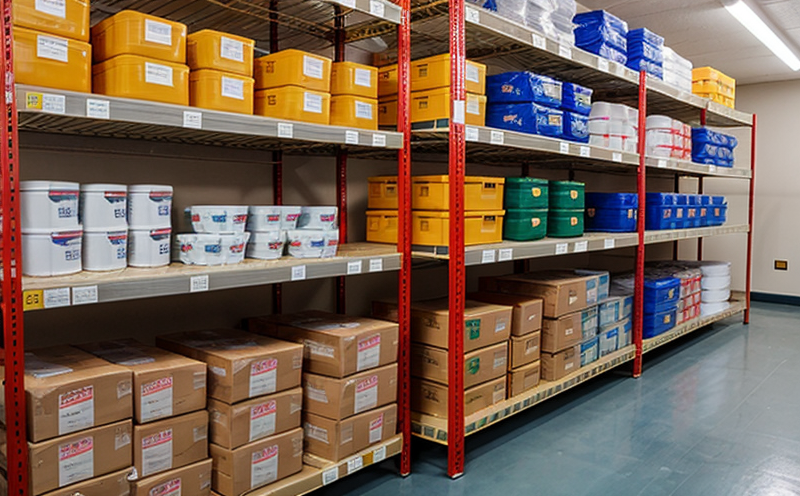ICH Q1A Long Term Stability Testing
The ICH Q1A guideline is a cornerstone in pharmaceutical development and quality assurance. This standard requires long-term stability testing to evaluate the chemical, physical, and microbiological stability of drug products over time under real-world storage conditions. The primary objective is to ensure that the product remains safe and effective throughout its shelf life.
The ICH Q1A Long Term Stability Testing service provided by Eurolab ensures compliance with this stringent regulation. This involves testing pharmaceuticals for their chemical, physical, and microbiological stability over an extended period under conditions that simulate real-world storage environments. The goal is to predict the product's shelf life based on these test results.
The process typically includes three critical stages: initial testing, ongoing monitoring during the drug's lifecycle, and final expiration dating. Initial testing involves exposure of the product to accelerated stability conditions for six months or longer. This phase aims to simulate long-term storage by subjecting the product to higher temperatures and humidity levels than expected in real-world scenarios.
During this period, various physical and chemical parameters are monitored closely. These include but are not limited to weight variation, moisture content, color changes, pH level shifts, solubility variations, melting point alterations, and any other relevant indicators of degradation. The results from these tests provide valuable insights into the stability behavior under accelerated conditions.
Ongoing monitoring during the drug's lifecycle is crucial for ensuring that the product maintains its quality over time. This phase involves regular assessments throughout the expected shelf life, typically every three months until six years post-commercialization. During this period, the same set of parameters is monitored to detect any signs of degradation or deviation from the established baseline.
The final expiration dating phase concludes the long-term stability testing process by determining a safe and reliable shelf life for the product based on all accumulated data from previous stages. This information is essential in setting appropriate expiration dates that ensure patient safety while minimizing waste through premature disposal.
For pharmaceutical manufacturers, compliance with ICH Q1A guidelines is non-negotiable when seeking approval from regulatory bodies like the FDA or EMA. Failure to adhere could lead to product recalls, legal issues, and reputational damage. By partnering with Eurolab for long-term stability testing, organizations can mitigate these risks by obtaining robust data that supports their claims of product quality and safety.
Our state-of-the-art facilities equipped with advanced analytical instruments guarantee accurate measurements and reliable results. Our team of experienced scientists uses internationally recognized methods such as those specified in ISO standards to conduct thorough analyses throughout the testing process.
| Parameter | Description |
|---|---|
| Weight Variation | The change in weight over time which can indicate moisture content or other physical changes. |
| Moisture Content | An important indicator of product integrity especially for hygroscopic drugs. |
| Color Changes | Might suggest oxidation or photodegradation processes affecting drug efficacy. |
| pH Level Shifts | Changes in acidity or alkalinity that may impact stability and patient tolerance. |
| Solubility Variations | Determines whether active ingredients remain soluble over time, impacting bioavailability. |
| Melting Point Alterations | Indicates potential phase transitions that could affect drug performance. |
| Microbiological Stability | Evaluates the presence and growth of microorganisms which can compromise product safety. |
Benefits
- Ensures compliance with ICH Q1A guidelines, enhancing regulatory approval prospects.
- Promotes safer products by identifying potential stability issues early in development.
- Reduces risks associated with product recalls and legal disputes due to non-compliance.
- Supports accurate shelf-life determination leading to optimized inventory management strategies.
The benefits of ICH Q1A Long Term Stability Testing extend beyond mere compliance; they contribute significantly towards maintaining high standards of patient care by ensuring that all approved drugs meet strict quality and safety criteria throughout their lifecycle.
Eurolab Advantages
- Expertise in pharmaceutical testing with a proven track record for accuracy and reliability.
- Up-to-date equipment calibrated according to international standards ensuring precise measurements.
- A team of highly qualified scientists specializing in various aspects of drug stability analysis.
- Dedicated resources aimed at delivering timely results that meet stringent deadlines set by clients.
Eurolab's commitment to excellence sets it apart as a reliable partner for pharmaceutical companies seeking comprehensive support in meeting ICH Q1A requirements. Our services not only facilitate successful regulatory submissions but also contribute positively towards enhancing overall product quality and patient safety.
Use Cases and Application Examples
- New Drug Development: Ensuring new formulations meet stability criteria before market release.
- Formulation Optimization: Identifying optimal conditions for storage to extend shelf life without compromising efficacy.
- Batch Release Testing: Verifying that each batch meets specified quality standards before distribution.
- Post-Marketing Surveillance: Monitoring ongoing stability post-launch to ensure long-term safety and effectiveness.
In conclusion, ICH Q1A Long Term Stability Testing plays a vital role in pharmaceutical development and manufacturing. It ensures that drugs remain safe and effective throughout their shelf life, thereby supporting patient care and regulatory compliance.





